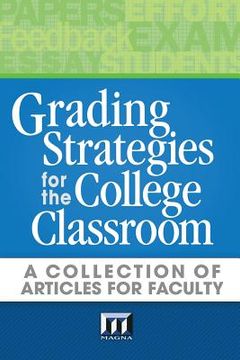Grading Strategies for the College Classroom: A Collection of Articles for Faculty (en Inglés)
Reseña del libro "Grading Strategies for the College Classroom: A Collection of Articles for Faculty (en Inglés)"
This book provides insights into managing the supremely complicated task of assigning a simple letter to a semester's work. This book is intended for faculty seeking to understand how to use assessment to enhance as well as measure performance, and it delivers some of the most innovative ideas for meeting that challenge. It presents new: Thinking about what grades should measure Ideas for developing robust assessment tools Strategies for encouraging students to pursue knowledge instead of grades Ways to ensure that assessments gauge performance and inspire effort This book contains a collection of more than 30 articles written by a score of highly accomplished college classroom veterans. The articles, first published in The Teaching Professor newsletter, address four critical aspects of the assessment process: grading exams, assessing papers, gauging participation, and engaging students in meaningful conversations about grades. Grading ExamsThe authors present creative solutions for the challenges of grading exams. Articles cover: Alternatives to final exams, including concept-mapping projects Research showing why cumulative exams may be a better teaching tool than unit exams How-tos for designing, administering, and managing security concerns of online exams Policies that reduce test anxiety and mitigate morale problems Grading PapersThis material is equally innovative when it comes to the challenges of assigning and assessing papers. Articles present high-impact ideas, including: A unique carrot-and-stick method to encourage students to create drafts of papers Ten practical tips for managing the paper-grading burden A manageable process-driven approach to grading that can be a lifesaver, particularly for new faculty A critical reexamination of the value of rubrics in grading papers Best and worst practices in grading papers Classroom ParticipationChapter three focuses on a perennial ambiguous grading area, classroom participation, providing insight into how student perceptions of participation can differ from those of faculty and how to reconcile the two. The authors share strategies for: Creating a participation rubric Helping students appreciate the difference between attendance and participation Assessing and grading online participation Reconciling rubrics with student self-assessments Talking with Students about GradesThe final section addresses the difficult subject of managing expectations and conversations about students' grades. This process begins on the first day of class and continues past the final exam. Topics include how to: Answer the question "What will we be graded on?" Handle the "I deserve a better grade on this" conversation Involve students in determining assignment weights to impact performance Deal with students' growing sense of entitlement The learning "story" that takes place over a semester is rich, complex, and unique to each student. The details of how an individual progresses (or doesn't) over the term, what skills are developed, and what knowledge is retained could fill a book. Yet, professors are asked to tell the story not in a book, on a page, over a paragraph, or in a sentence, but in a single letter. Small wonder grading is such a persistent challenge for both new and veteran faculty. Bulk PurchasesTo purchase multiple print copies of this book, visit www.MagnaGroupBooks.com

